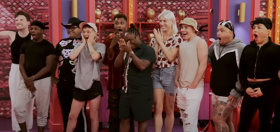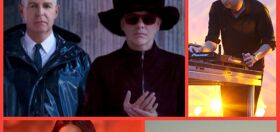
The U.S. Supreme Court has yet to definitively rule on whether religious business owners can break anti-discrimination laws by refusing to serve LGBTQ people on the basis of their “sincerely held religious beliefs.” But a case currently in front of the Eighth U.S. Circuit Court of Appeals could easily give the U.S. Supreme Court another chance to get it right (or horribly wrong).
This case involves Carl and Angel Larsen (pictured above), a married straight Christian couple from Minnesota who runs a videography business called Telescope Media Group.
In 2016, the Larsens sued the state’s human rights commission saying that Minnesota’s public accommodation laws requiring them to do business with same-sex couples might violate their constitutional right to freedom of religion, requiring them to promote “a conception of marriage that directly contradicts their religious beliefs.”
Keep in mind: No same-sex couples had actually asked the Larsens to shoot their wedding. The couple preemptively sued, and the reason is apparent when you find out who’s legally representing them: Alliance Defending Freedom (ADF).
How about we take this to the next level?
Our newsletter is like a refreshing cocktail (or mocktail) of LGBTQ+ entertainment and pop culture, served up with a side of eye-candy.
Related: Supreme Court has begun undermining marriage equality
That’s right, ADF, a right-wing legal organization designated as a hate group by the Southern Poverty Law Center. The ADF has equated homosexuality with child rape, pushed for the criminalization of gay sex in countries around the world and thinks that the “homosexual agenda” wants to destroy Christianity.
The ADF regularly takes on cases to challenge LGBTQ rights around America, and so they’re supporting the Larsens’ case for the exact same reason.
And if you need proof of the Larsens’ anti-LGBTQ bias, you have only to look at their reasoning. They said they wouldn’t shoot same-sex weddings for the same reason that they wouldn’t shoot videos depicting “sexual immorality, the ‘destruction of unborn children,’ racism or racial division, inciting violence or degrading women.”
Yep. Being asked to film a same-sex marriage is similar to being asked to film a live abortion or someone beating a woman.

It’s true that the Larsens, and businesses like theirs, can face fines and jail time for refusing to treat all customers equally. But allowing businesses to treat LGBTQ and heterosexual customers differently sets up a dangerous slippery slope.
Refusing service may not seem like a big deal when it comes to wedding-related businesses —go get your cake somewhere else, right? But it could literally mean life-or-death when it comes to other businesses, like if a pharmacist denied medicine to an LGBTQ person based on their religious beliefs, something that actually happened earlier this year.
While the three-person Eighth U.S. Circuit Court of Appeals is expected to issue their ruling in two to three months, the case could easily make its way to the U.S. Supreme Court and help determine the future of LGBTQ rights and same-sex marriage.
Earlier this year, the U.S. Supreme Court ruled in favor of an anti-gay baker who refused to sell a same-sex wedding cake, but only because the Colorado Human Right Commission had expressed anti-religious sentiment during their proceedings against the baker.
The court also had a second chance in a case involving a religious flower shop owner who refused an arrangement for a gay wedding. But the court asked the state of Washington to re-examine whether their human rights commission had expressed any anti-religious bias in that case too. There’s no word so far on how that case is going.
As such, the Larsen case could give the court their third chance.




















1898
freedom of religion is not freedom to discriminate. sane and intelligent people understand that.
the arguments made by this couple and by organizations like ADF are bogus. the fact that they don’t refuse service to atheists, agnostics, buddhists, wiccans, satanists, etc., is proof of their hypocrisy and their highly-selective application of their claimed right to discriminate.
Al
1898…Very good point.
Umoja
Basically if it is part of your religion not to film same-sex weddings, then you must not create a wedding filming business within a jurisdiction that prohibits you from discrimination. It’s really that simple, you can’t bend the law to suit your interpretation of your religion – but if you’re actually right, Jesus gonna bless you when you die.
CJones01
“They wouldn’t shoot videos depicting ‘sexual immorality, the ‘destruction of unborn children,’ racism or racial division, inciting violence or degrading women.'”
A married, heterosexual couple having sex expressly for procreating seems pretty damn Christian. Someone hire them for film a married straight couple trying to conceive!
PLAYS WELL WITH OTHERS
Why the fcuk can’t they just leave us alone?? Hatefilled. noxious, abhorrent, vile smcubags…..
And not for nothing he is beyond ugly. To the point of being disturbing looking…
PLAYS WELL WITH OTHERS
And I truly hope that in these cases fact that we are born Gay. It is NOT a choice.
One’s religion is a choice.
Therefore your BELIEFS do not trump my RIGHTS….
MrMichaelJ
Can you please put the word straight in quotes, as in married “straight” couple, because neither one of those people are straight…
GayEGO
Because this is about civil, equal rights, our rights are inalienable, discrimination is an alienable action which is a violation. The Freedom of Religion Act only permits one to practice their beliefs within the boundary of their religion and cannot force their beliefs outside their religion. The Larsens should run their videos inside their church and not in a public, civil profit making business.
Lacuevaman
why the F dont queers just move on …on to other contractors/businesses that will do the wedding filming or bake their Gdamn cake? Why screen and and start a fight and then get back on the porch and leave others fight for you. F’ing sissy queens. Geezus
Lacuevaman
scream
1898
you didn’t read the article, did you?
1898
From the article: “No same-sex couples had actually asked the Larsens to shoot their wedding. The couple preemptively sued.”
PLAYS WELL WITH OTHERS
If you took the time to actually read the thread no Gay actually tried to do business with this abhorrent smcubag couple. This is part of a coordinated attack by right wing hatefilled filth to get cases before Supreme Court to deny any further and take back equal rights for Gays in this country.